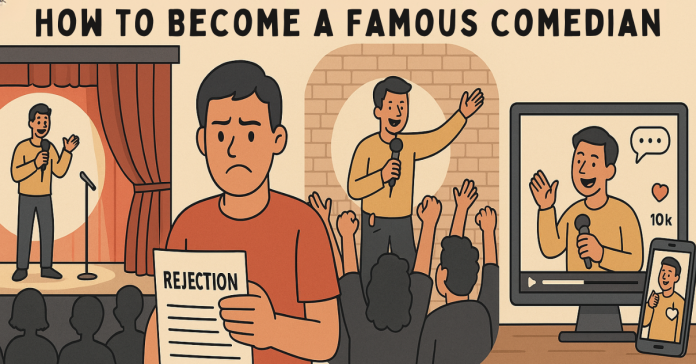If any one aspires to become a comedian of any sort here is what they have to go through. Buckle up, my friend. Amateur night is the stepping stone from which one builds their way up the comedy ladder with open mike performances that are reminiscent of funeral services, rejection letters enough to carpet the pentagon, and moments of success that are akin to addiction and compulsion if one is to stay hooked to the pleasure button. However, for those who continue to seek the opposite of sadness, the road can be filled with pleasure and despair simultaneously.
The Comedy Landscape: More Competitive Than Ever
The change that has characterized the comedy industry in the current generation has not been felt in any other comedy fields like it has been felt in the current generation of comedy. This means that today there is no way that one could just go to New York or LA and influence a club owner to help him or her to achieve success. Comedy today could be described as more of a free for all through podcasts, use of social media, streaming, comedy specials as well as good old comedy clubs. Expectations have risen to meet this level of accessibility and amateur accessible while at the same time making it challenging to make your voice heard above the din.
Finding Your Voice: The First Mountain to Climb
Before you can make people laugh on the consistent basis you will need to identify what makes YOU laugh. The comedic voice is a very personal thing that is unique like everybody’s fingerprints. Some comedians are endowed with their trademark immediately while for others it may take a number of years of trial and error.
The key is brutal honesty. Which issues raise your personal enthusiasm or passion? Which of these opinions may you get you banned from family gatherings? What makes one question what many others do not see? These are the substrates of your comedic personality.
The Unglamorous Grind: Open Mics and Small Clubs
Prefacing their stand-up comedy with Netflix specials while ignoring the actual practice of performing at open mics is similar to considering the possibility of winning the Super Bowl while shunning practice on the field. There’s no skipping this step. Every comedian also had to begin performing in front of an empty or almost empty hall with no one but laughter – or lack thereof – to accompany his efforts.
As any stand-up comedian would know open mics are comedy boot camp harsh, essential and the best way to get better at your craft. You’ll bomb spectacularly. There is there are jokes you expect to crack up the entire room only for them to draw a less response than the vacancies in a barren desert. You are to follow a comedian who killed and perform before an audience whose chuckles are already wasted.
The Digital Game: Building an Audience Online
While traditional standup remains the heart of comedy, the internet has created new pathways to fame. Platforms like TikTok, YouTube, and Instagram have launched careers for comedians who might never have broken through the traditional gatekeeping system.
Creating consistent online content accomplishes several things simultaneously:
- It forces you to generate material constantly
- It helps you find and build an audience
- It creates a portfolio that bookers and agents can easily access
- It gives you data on what resonates with different demographics
But beware the trap of chasing algorithms over artistic growth. Many “viral comedians” struggle to translate their online success to live performance. The best approach uses digital platforms as one tool in a broader strategy, not the entire strategy itself.
Networking Without Being Needy: The Relationship Game
Even in the easier path of comedy, your ticket to that preserve depends greatly on your reputation. This is because the comedian who is energizing, encouraging to other comics and who shrugs off the sound of a crop of blinding ignorance like lightening will walk away with more shots at a chance than the conceited ‘prodigy’ who turns playing at the open mics into a favor on other performers.
Some practical networking advice:
Stay after shows. Talk to other comedians. As with the rest of the posts, response genuinely to the jokes that were made which were good. Ask thoughtful questions. Remember names. Go to specific areas repeatedly in order to be recognized often. Do not only push for your shows when you are part of the show but feel for the other shows too.
The Business Side: Comedy as a Career
At some point, if you wish to aspire comedy stardom, perhaps, you should begin considering to take comedy as a business. This entails familiarity with contractual situations, bargaining for compensation, work-related online presence, and aiming for relevancy based on broad objectives.
It is amazing that many comedians in the world fail at this aspect. They are people who simply don’t wish to be bothered with mundane tasks that are taking them away from the creative process. However, the most successful comedians know that the commercial and the artistic aspects have to be in sync.
Mental Health: The Unspoken Challenge
What many people don’t speak about is that comedy is for people who are dealing with their suffering in some way and the process of becoming famous brings a whole new set of psychological issues.
The rejection is constant. The financial instability is stressful. This type of life—staying up late, being in the environment where alcohol is used frequently, and having an irregular working schedule—worsens the existing mental disorders. Next, there is that peculiar thing when one has to make strangers burst into laughters, yet, on the inside there is anything but a laugh.
Defining Success on Your Own Terms
Comedy to me is not limited to the level of Kevin Hart or Ali Wong as comedy can be done by anyone, anytime, and in anyplace. Therefore, there are working comedians steadily earning their income by performing in the small to the mid-level comedy clubs. There are writers who focus on writing only comedy, though they perform very few comedies and instead they are paid regularly to write jokes for others. Many business-aimed comedians have a way of making good sales off comedy performances in corporate functions.
The X-Factor: Timing and Luck
It is true that Destiny plays an important part in comedy stardom that is being in the right place with the right material. You are lucky to catch the eye of an old school late-night booker. This is presented in a viral clip, which catches the attention of a streaming executive. In this case, a more experienced comedian develops a liking for you to perform opening sets for his touring company.
The Final Word: A Journey Worth Taking?
It is utterly foolish to strive for comedy fame. Well that is determined by whether one would be willing to spend the rest time doing anything else if they are not happy doing what they do. If comedy is one of several potential occupations, which attracts you choose another occupation. A new feature to this problem is that the ratio of work input to the work output which although is too skewed to warrant such a proposition but it only holds true if one is making their passion.
If that’s the kind of person you are, then we will meet in an open mike somewhere. I will be the one taking notes to the performances, observing the audience, and trying to see why that last joke was not well received as I expected.

